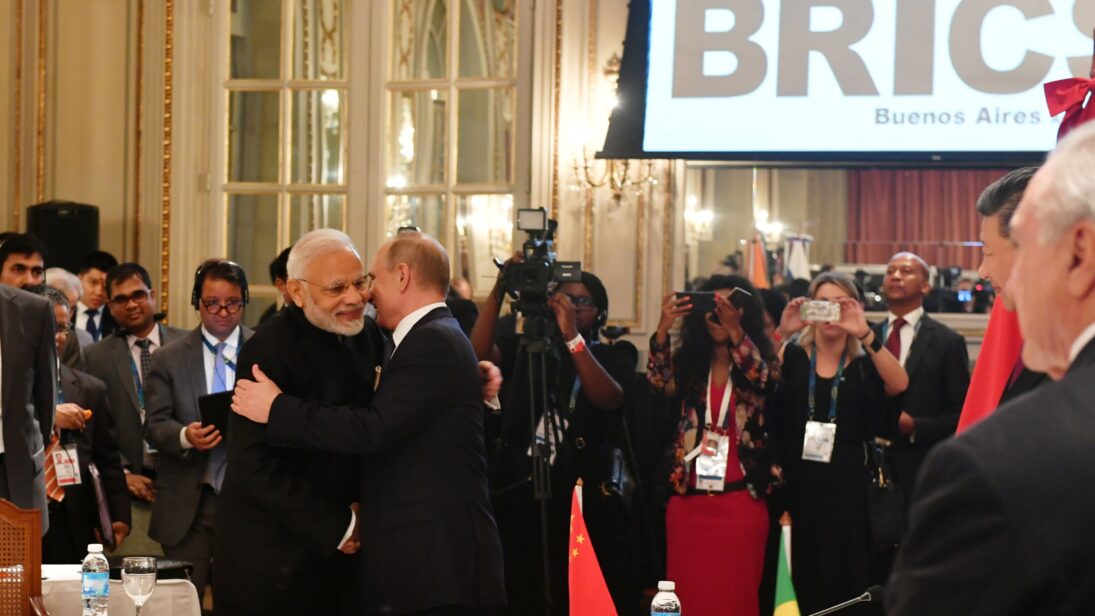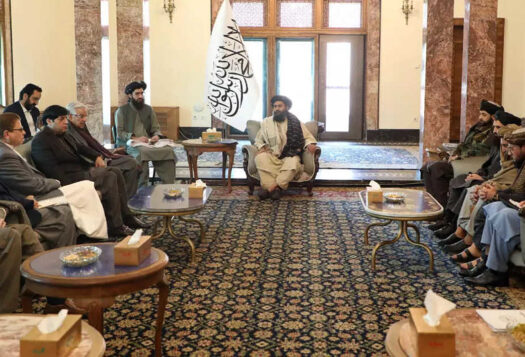
When Vladimir Putin announced a full-scale assault on Ukraine, he justified the invasion as an effort to “denazify” Ukraine. While the global rise of far-right nationalism has not left Ukraine unscathed—the country’s far-right party received two percent of the vote in 2019—Ukrainian President Volodymyr Zelensky won a fair democratic election with 70 percent of the vote (he is also Jewish, and several of his family members were killed, by Nazis, during the Holocaust).
Putin’s “denazification” pretext for invasion is a form of disinformation that has a storied history for Russia. Like many disinformation campaigns—false information employed deliberately by actors to manipulate, mislead, and propagandize—Russian “denazification” has some basis in truth; specifically, it has historical bearings in the Eastern front effort to defeat the Nazis. Since 1945, Soviet and Russian actors have misused this historical fact to justify contemporary offensive military or intelligence activities, granting them a false “moral” shading. During the Cold War, Soviet intelligence actors attempted to defame Western European politicians as Nazi collaborators while conducting surveillance across the Iron Curtain. Now, Putin’s attempts to legitimize his war include falsely portraying Ukrainian resistance fighters as “Nazis.”
This “denazification” rhetoric, and disinformation’s role in falsely justifying Putin’s war, offers a lens for understanding how a future crisis might play out in South Asia. Rising authoritarianism and strongman politics across the subcontinent, combined with the rapid proliferation of misinformation on social media, have generated a climate ripe for manipulation through disinformation campaigns. Pakistan has a longer history of pseudo-authoritarian politics, as part of which the state has crippled the free press, enabled the rise of misinformation, and, most recently, distorted reporting on the radical Tehrik-e-Taliban (TTP). But it is India’s Hindu nationalist politics that is most likely to drive disinformation and manipulation efforts in a future crisis.
As hate speech becomes normalized, and the line between real and fake news tenuous, India’s domestic climate has come to more closely resemble Russia’s authoritarian, cult-of-personality politics.
The Bharatiya Janata Party (BJP) government at the helm in India has won elections in part because of its social media machine, or IT cell, which has helped disseminate misinformation and conspiracy theories domestically. Hindu nationalist groups have used widespread hate speech spread through Facebook and WhatsApp as an impetus for mob violence against Muslims, especially during the 2020 Delhi Riots. This has played out amidst rampant government-led clampdowns on independent journalism as the leading party has sought to squash dissent. Emboldened by recent electoral victories, the BJP and its supporters will likely double down on authoritarian, ethnonationalist tendencies, including by increasing state-led disinformation campaigns.
As hate speech becomes normalized, and the line between real and fake news tenuous, India’s domestic climate has come to more closely resemble Russia’s authoritarian, cult-of-personality politics. We can see early signs of how India’s domestic reshaping affects policies towards its neighbors in the framing of the Citizenship Amendment Act, which implicitly casts all Muslim émigrés as security threats to India.
In the event of a new India-Pakistan crisis, the Indian state may employ disinformation to justify and rally support behind offensive military activities or escalations. The Pakistani government has already used Nazi expansionist rhetoric to ward off Indian military activity along the Line of Control (in light of the 2020 India-China border standoff) and draw international attention to the situation in Kashmir. And during the 2019 Pulwama/Balakot crisis, media outlets in India and Pakistan respectively helped mobilize public support in favor of escalation. India’s widespread anti-Muslim, pro-Hindutva misinformation and propaganda could easily become fodder for inflated anti-Pakistan sentiment, defined along ethnonationalist lines (with all Muslims, including Indian Muslims, representing an internal/external “enemy” and Hindus the Indian “in crowd”). Analysts must not dismiss Putin’s “denazification” disinformation as the lie of war-baiting maniac, but instead see it as the natural strategy of a fascist state with imperial pretensions. As India’s domestic political climate has taken an authoritarian, ethnonationalist turn—and South Asia remains ripe for crisis escalation—watchers should see the BJP’s IT cell, press crackdown, and online hate speech as potential ammunition in wartime.
Editor’s Note: This article is part of a series of SAV Editors’ reflections on Russia’s invasion of Ukraine and its implications for South Asia. Read the full series here.
***


